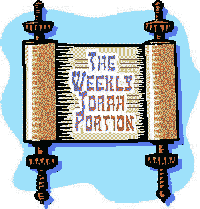Search our Archives:
» Home
» History
» Holidays
» Humor
» Places
» Thought
» Opinion & Society
» Writings
» Customs
» Misc.
|
The Proper Foundation
By Michael Chessen
In this week's Torah reading of Toldot, we witness the birth and
development of Jacob, father of the twelve tribes which would sow the
seeds of what would ultimately become the Jewish people. Various
commentaries on the Torah have pointed out that neither Abraham nor Isaac
had the merit to beget the twelve tribes because each of them bore a
personality trait, which, though essential to fulfilling their spiritual
missions, nevertheless resulted in the birth of a spiritually deficient
son: Ishmael's sexual immorality was the extreme expression of Abraham's
loving kindness, and Esau's spilling of blood was the extreme expression
of Isaac's spiritual zealousness. While Abraham loved Ishmael no less than
Isaac, and Isaac loved Esau no less than Jacob, both Sara and Rebecca were
forced to take extreme measures to neutralize the apparent or even
potentially negative influences which Ishmael and Esau posed for the
righteous Isaac and Jacob.
Jacob's character was a synthesis of Abraham and Isaac, a balance
which we link with "truth" in our daily prayers("give truth to Jacob...").
However, the question which begs our attention is how truth coexists with
Toldot's central drama which has Jacob posing as Esau in order to receive
the blessings which Isaac had intended for Esau. While it was Rebecca who
"cooked up" this scheme, Jacob's only initial opposition to carrying it
out was on the basis of his potentially being exposed, and not because of
it possibly being the wrong thing to do.
If Abraham was the breaker of new ground and Isaac its guardian,
Jacob is the one who has to begin the task of building upon it. In dealing
with the numerous spiritual challenges which lie beyond the tents of Torah
study which he frequented, Jacob has to be able to deal with problems
which often fail to offer simple black and white solutions. Jacob's future
dealings with his treacherous uncle/employer, deceptively named
"Lavan"(white) vividly demonstrate this principle.
While Esau had developed into a "cunning hunter", he was nonetheless
utterly incapable of perceiving and understanding the complexities of
life. He sells his birthright to Jacob for a bowl of soup, not just
because of hunger, but because he was "going to die". There was no
tomorrow beyond the needs of his stomach. When Esau later marries two
women with seemingly praiseworthy names, "Yehudit" or "Jewess" (kosher
style) and "Bosmath" or "fragrant one", the bitter reaction of both Isaac
and Rebecca belies any connection between these women and their lofty
appellations. When Esau realizes that he has greatly displeased his
parents, he marries a third, apparently more "kosher" wife, but fails to
see the need to send the others on their way.
Although the future of the Jewish people necessarily had to rest with
Jacob rather than Esau, there was nevertheless a need for Jacob to
incorporate a measure of his twin brother's survival skills together with
his own high spiritual ideals. Upon Isaac's blessing Jacob in the guise of
Esau, he utters one of the most famous verses of the entire Torah: "The
voice is the voice of Jacob, but the hands are the hands of Esau".
(Genesis 27:22) Whether Isaac fully realized the significance of this
statement is open to interpretation. But it in any event elegantly
testifies that the future patriarch who was born a synthesis of Abraham
and Isaac had struck a balance of his own.
Wishing you all a Shabbat Shalom !

|
|
Please let us know if you see something unsavory on the Google Ads and we will have them removed. Email us with the offensive URL (www.something.com)
|





|
